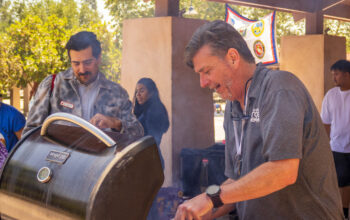Imagine a story based on the classic Romeo and Juliet situation – except instead of the family feud being real, it’s fabricated to bring the pair together. That is the basis of “The Fantasticks,” currently being performed by actors from Pierce College’s theater department.
The show was well done in all aspects, from acting and singing to choreography and musical accompaniment. Small changes in the script made fantastic differences – even something as minor as changing a single line from one person to a similar character made moments seem sweeter than they would’ve been otherwise.
It is a must-see show, even for those who have already seen it before.
“The Fantasticks,” running through to Nov. 3 at Pierce’s temporary Performing Arts Complex, is a 1960 musical with an off-Broadway production that ran for 42 years. It is the world’s longest-running musical, with many well-known tracks such as “Try To Remember,” “Soon It’s Gonna Rain” and “Much More.”
The story centers around a young man named Matt (Mark Needle) and a girl named Luisa (Samantha Labrecque). Their fathers, Hucklebee (Mark Lewis) and Bellomy (David Colville), had built a wall and started a fake feud in order to push their children into marriage.
The fathers hire a professional by the name of “El Gallo” (Michael Hovance, also the narrator) to arrange a kidnapping of Luisa where Matt saves her with the help of Henry (Michelle Hallbauer) and Mortimer (Vance Wells).
Matt’s heroic rescue of Luisa causes the fathers to be so proud and happy that the supposed feud ends, allowing them to drop the aggressive pretense and let the two be together. The happy families pose together at the close of the first act as the narrator ponders how long the fathers can maintain their happy countenances.
The acting was solid throughout the musical, seeming to fit the balance of serious, playful and briefly fantastical that the plot exudes. There was a definite sense of camaraderie and friendship between the actors, fitting in with their roles perfectly.
Even Wells’ death scene within the play caused a brief pause in the music as musical director and accompanist Cassie Nickols stopped to watch it with a worried expression along with the crowd.
The set manipulation was simple, but nicely done. The Mute (Ondřej Pšenička, also the Wall) and occasionally other cast members moved the props on stage. This made the changes in scenery a physical and observable part of the play, allowing the audience to participate in the changeovers visually.
The microphones could have been more balanced with the accompaniment when moments are intense, though everything was still audible and understandable without much issue.
The piano accompaniment by Nickols was great. It drew the audience in just when it was necessary – and even an occasional, poignant pause caused the crowd to truly fear for the actors when they seemed to be in trouble.
No details were spared even given short windows of practice before they had to start performing the show. Putting it all together, “The Fantasticks” was well-acted, sung, played, danced and directed by all involved.



